 Pixar’s The Incredibles has taken on whole new dimensions of meaning for me since I’ve been married and become a father. While it’s long been one of my favorite films, hearing Mr. Incredible tell his wife “I’m not strong enough” opens up floodgates of emotion I didn’t even know I had. And don’t even get me started on seeing the kids work together to escape the island; basically, by the time the credits roll, I’m usually a blubbering mess. So I was longing for the sequel to my favorite Pixar film (and my #3 film of all time) to be at least halfway decent.
Pixar’s The Incredibles has taken on whole new dimensions of meaning for me since I’ve been married and become a father. While it’s long been one of my favorite films, hearing Mr. Incredible tell his wife “I’m not strong enough” opens up floodgates of emotion I didn’t even know I had. And don’t even get me started on seeing the kids work together to escape the island; basically, by the time the credits roll, I’m usually a blubbering mess. So I was longing for the sequel to my favorite Pixar film (and my #3 film of all time) to be at least halfway decent.
Thankfully, it’s more than decent. While The Incredibles 2 may not be quite as super as its predecessor, it is a solid sequel and an excellent film in its own right; Brad Bird displays a new deftness with the action genre, no doubt honed by his turn on the Mission: Impossible franchise and buoyed by a decade-and-a-half of advances in computer animation technology. It has great action, a perfect amount of heart, and characters that feel like they’ve grown and continue to do so.
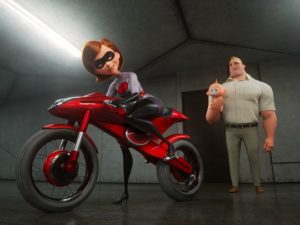 The premise of the film follows the formula of the previous film’s premise: the hero-for-hire escapades of a super-turned-civilian-turned-super-again. This time, that hero is Helen/Elastigirl (Holly Hunter), fighting to change the image of the superhero in the eyes of the world and change the law to allow supers to work openly again. It’s a deft and subtly matter-of-fact message of empowerment that works quite well in the universe: she has a particular skill set that lends itself to being a good hero without being sloppy. The fact that she’s a woman isn’t really commented on, nor (aside from one character-building moment) is the fact that her husband Bob/Mr. Incredible is forced into the role of househusband—even though it’s nontraditional, especially for the film’s mod-60’s aesthetic.
The premise of the film follows the formula of the previous film’s premise: the hero-for-hire escapades of a super-turned-civilian-turned-super-again. This time, that hero is Helen/Elastigirl (Holly Hunter), fighting to change the image of the superhero in the eyes of the world and change the law to allow supers to work openly again. It’s a deft and subtly matter-of-fact message of empowerment that works quite well in the universe: she has a particular skill set that lends itself to being a good hero without being sloppy. The fact that she’s a woman isn’t really commented on, nor (aside from one character-building moment) is the fact that her husband Bob/Mr. Incredible is forced into the role of househusband—even though it’s nontraditional, especially for the film’s mod-60’s aesthetic.
And while Helen is the star of the picture, Bob is no background player. His interplay with his kids as he learns how to be an effective single father is heartwarming and enjoyable. So is the physical comedy of his relationship with Jack-Jack, whose superhero nature is still a secret to the Parrs. It’s always nice to see a competent, helpful, hardworking dad portrayed in cinema, and Bob certainly seems to have learned his lesson from the last film; he is determined to be the supportive husband his wife needs, and the father his children need.
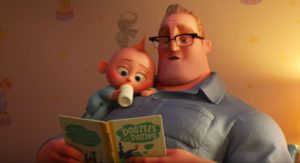 Every character in the film draws you into their narrative, though; Violet and Dash bring back the pseudo-antagonistic relationship they had throughout the previous film, with the “love” dial turned up a couple of ticks. Edna Mode is more charming than ever. The fresh-faced “Voyd” is a scene-stealer who uses her powers in fun, compelling, and even surprising ways. And from the stars to the bit players, everyone is given opportunities to shine in their own unique ways (newcomer Krushauer, for instance, is hilariously befuddled when asked to un-crush something).
Every character in the film draws you into their narrative, though; Violet and Dash bring back the pseudo-antagonistic relationship they had throughout the previous film, with the “love” dial turned up a couple of ticks. Edna Mode is more charming than ever. The fresh-faced “Voyd” is a scene-stealer who uses her powers in fun, compelling, and even surprising ways. And from the stars to the bit players, everyone is given opportunities to shine in their own unique ways (newcomer Krushauer, for instance, is hilariously befuddled when asked to un-crush something).
Now, I mentioned that it isn’t quite as super as its predecessor. And that doesn’t mean that it’s bad, of course; but rather that the fourteen-year gap between films may have made some things stand out that shouldn’t have.
I mean, unfortunately, the voices. It’s a remarkable achievement that Pixar was able to rehire nearly the entire voice cast from The Incredibles for this film; and none of them are bad, but Mr. Incredible’s Craig T. Nelson sounds noticeably older; Huck Milner does an admirable job as Dash, but is definitely not Spencer Fox (who, by virtue of being 25, couldn’t really pull off the character anymore); Sarah Vowell sounds like Violet, but doesn’t really act as much like her; and tragically nobody could fully replace the late Bud Luckey as Agent Rick Dicker, though Jonathan Banks gives it a pretty good go.
The other thing that hasn’t aged well in the interim between films is Disney’s over-reliance on certain plot twists and turns that I won’t spoil here. It’s given a slightly fresher take in this iteration, but the dramatic third-act twist is loudly telegraphed within the first ten minutes of the film.
Still, it’s a stylish, high-flying, action-packed, adventure-filled, heartwarming story that has something to say, and says it well.
Ceding Control
Warning: There are major plot spoilers below. Proceed at your own risk.
One of the things I like to ask when I’m reviewing a film with an eye toward redeeming its cultural value is “is the villain right?”
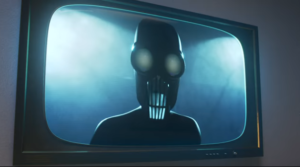 Brad Bird’s story about a disillusioned villain (“Screenslaver”) turning people who are acting like zombies in front of their TV into actual zombies, using the brain-melting devices they voluntarily brought into their own homes, seems a bit prosaic and cudgel-like; which makes the eventual reveal of the true villain and her actual plan a bit fresher than most movies which use such a reversal.
Brad Bird’s story about a disillusioned villain (“Screenslaver”) turning people who are acting like zombies in front of their TV into actual zombies, using the brain-melting devices they voluntarily brought into their own homes, seems a bit prosaic and cudgel-like; which makes the eventual reveal of the true villain and her actual plan a bit fresher than most movies which use such a reversal.
Evelyn Deavor’s comparison of screens to heroes and the populace’s over-reliance on both is much more subtle (and closer to what I expected from a Brad Bird story). And, for our purposes, much more interesting.
In a Film & Theology presentation about The Incredibles, about seven years ago, I discussed a world which didn’t need its heroes and compared the world of Bob and Helen with our own world’s rejection of the Savior who seeks their salvation. I talked about the world’s demand that we hide our gifts and our purpose for its own convenience.
The Incredibles 2 welcomes us back to the world and shows us what they’ve put in place of the heroes and saviors they need: screens. It’s not exactly difficult to see the parallel Bird is trying to make here. But far from a morality tale on the evils of screens, it’s comparing them to superheroes – both have great utility, but when they’re controlled by someone with evil intent, can be used to cause great harm.
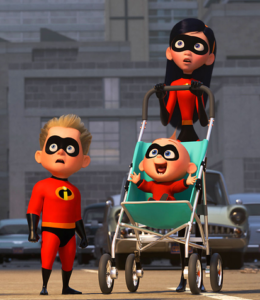 And it’s easily applicable to those of us who happen to live in the real world: the lies you believe about the world around you cloud your wisdom, turning you into a zombie with destructive intent and using your powers to harm those around you.
And it’s easily applicable to those of us who happen to live in the real world: the lies you believe about the world around you cloud your wisdom, turning you into a zombie with destructive intent and using your powers to harm those around you.
Still, I should take the hypnotic plank out of my own eye before I start removing the mind-controlling speck from yours. I often allow myself to be controlled by the evil intent behind the amusements that the world offers; becoming distracted by the flashing lights around me, believing it will fulfill me, and driven to apathy and laziness.
And in all this, my only hope is to remove the hypnotic goggles. Or, more correctly, for Someone to remove them for me. That’s the only place where my salvation lies: the work of the Savior from whose cross I am being distracted.

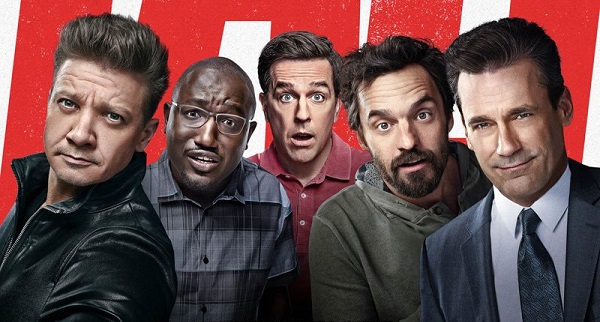

1 comment